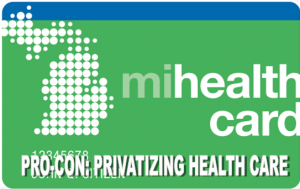CON: Healthcare is a right, not a privilege
February 16, 2017
We know how the bathrooms at Portage Northern are absolutely trash, right? There are a lot of reasons for this, but one of the main ones is that the custodial staff has been privatized. The move, which allows different companies to try and undercut each other to get the job, demonstrates an incentive for efficiency and cost reduction on behalf of the district, but the physical reality often doesn’t match the financial one. With a contract staff that has an attachment to their employer and not the building, privatizing the janitorial staff has actually led to “cutting corners” by skimping on the quality of the work and losing the pride and personal connection to the work environment. The end result is bad for everyone but the district, actually: the custodians get paid low wages and the students get dirty bathrooms. This is exactly what happens when the government privatizes health care: the insurance companies make big bucks, but the doctors and patients suffer the consequences.
Privatizing a health care system might save the United States’ government money, but it will create lots of barriers for the impoverished community. This simply creates inequality and division between the wealthy and the poor, which is the last thing we need as a people. Additionally, while the United States thinks they are saving marginal money (which is borrowed money for securities), they are limiting American citizens to pay more to a private health care system over a public one. According to www.valuepenguin.com, most Americans who live in the state of Michigan are paying at most $400 for their health insurance on a monthly basis, and premium plus a co-pay. At that same time, the public system costs under $100 monthly with no co-pay. Without a doubt, this flux in price will highly affect families who cannot afford basic necessities but who are just as important as anyone else.
Furthermore, the right to health care can save lives. A study done in 2009 at Harvard University shows that the lack of healthcare is in partnership with 44,789 deaths per year. This is a 40% increase in risking death in our everyday lives. On this note, according to an analysis of Canada’s healthcare system by the Atlantic, if we had similar free or reduced health care prices, it would save nearly 50,000 preventable deaths. How helpful would that be? People who cannot afford privatized healthcare may get sick and not be able to get the support that they may need. Healthcare is not easy to get either. So the nearly 20 million people who received it within the last 8 years, have worked hard to get the help they need, and to have it privatized would destroy what they have fought for.
Although privatized healthcare creates inequality, it is, in fact, a human right. In 1948, the United States and 47 other nations agreed to The United Nations Universal Declaration of Human Rights. The document says that “everyone has the right to a standard of living adequate for the health and well-being of oneself and one’s family, including… medical care.” Privatizing health care would do the opposite to the American people and higher prices, leave more and more people in risk.
In fact, 54% of the United States budget funding is geared toward funding toward the military, while only 6% of the money is for Medical Care and Health. The U.S is one of the richest countries in the world, yet some think privatizing health care is necessary when our government actually has a sufficient amount of money to support our people. According to Slate.com, a Reaper drone costs $28 million; one Hellfire missile (Lockheed Martin/Raytheon) costs about $70,000; one Paveway bomb (Lockheed Martin/Raytheon) about $20,000. The total cost of one weapons load for a Reaper – four Hellfire/ two Paveway – is at least $320,000, a third of a million dollars. According to quotes provided through healthcare.gov from major insurance companies, the bronze ACA plan costs a Michigan resident making $16,000-$47,000 per year $77.52 per month (or $930.24 per year) for a basic plan with a $2500 deductible. Using that combined amount of $3430 annually, the government could provide healthcare for 8, 255 people for the cost of ONE fully-functioning drone. We can clearly afford to spend a little less on military and a little more on our healthcare system, and for the health of our citizens, we should make it a priority to do so.
The Affordable Care Act that Obama put in place is actually benefitting the American people in ways privatizing insurance cannot; specifically: many more people are insured, people can’t be turned away from getting insurance due to a pre-existing condition, young adults can stay on their parents’ insurance until age 26, and women’s services are protected. Right now under the ACA, birth control is covered by all employers, but under a privatized system it can cost $40-$75 per month (kidshealth.org), which could have serious consequences for women, especially those who are young or poor. Also, free preventative care is offered annually, so patients aren’t coming in just for emergency visits, but for care and well-being. Privatizing health care would literally diminish all of the change that has occurred and people would not only no longer feel protected, unless they have a high income and no pre-existing health conditions, they will literally be less protected.
No healthcare system will be perfect, but the quality of life each human being who lives in this country, regardless of income level, should matter. All people deserve the necessity of care and the support they need to live happy and healthy lives. Privatizing our health care system would put many Americans at risk, especially those who need the help and healthcare the most.




